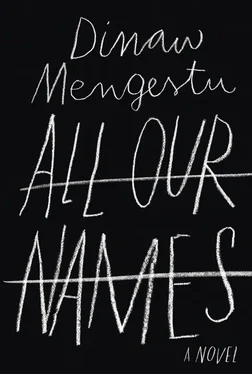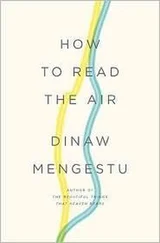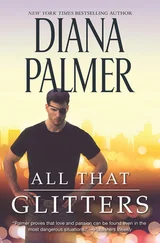By noon, the campus was completely abandoned except for a few soldiers who patrolled with their guns slung over their backs.
“Did you ever study any science?” Isaac asked me.
I lied and said, “A little in high school.”
Isaac did the same. “Me, too.”
He walked to the large wooden cabinet that stood alone in the back of the room and removed the lock.
“Don’t worry,” he said. “I wasn’t the one who broke it.”
The cabinet had once held all the necessary supplies a classroom full of science students would have needed, but the only items left were a pair of plastic goggles and a single row of beakers and test tubes, many of which were slightly cracked and all of which were stained. Isaac took everything out and arranged it on one of the long black tables.
“What do you think we’d need,” he asked, “to make a bomb?”
“Depends what kind,” I said.
“Something simple.”
Hanging on one of the walls was a large laminated chart headed “Periodic Table.” I knew just enough about it to understand that the element in one box combined with the element in another lay at the heart of much of what I saw and touched every day. There had been a young white American teacher in my high school — if I remember correctly, Rich was his name. He had brought one of those charts with him from America, and every day he asked us to pass it around from one person to another so, he said, we could all “feel like we had the world in our hands.” Because he was white and came from America, we took what he said seriously but at the same time believed he was crazy. “Africa is where America sends its crazy people” was the common refrain among us, and we always laughed with each variation of that thought. Each of us knew that, more likely than not, what Rich said was true, and that by extension our ignorance was so vast as to be unfathomable; the only power we had was to make a mockery of what he said.
I took the chart down, and as soon as I laid it on the table I began to strip it of all its meaning.
“We need a bit of Pb, and Fe, and Zr,” I said. I didn’t pretend to know the proper names of any of the elements, and if someone had come along then and tried to tell me, I would have said he had no idea what he was talking about. This was my world, and in this reality I was the one who dictated the terms, and according to me anything Isaac and I wanted could be made into a bomb.
Isaac made for the blackboard; there was no chalk to write with, so he pulled a marker from his pocket and wrote everything I said on the board in immaculate script, so clean that no one would have to guess what the letters were. He made his own additions to everything I said. He threw in plus signs, added parentheses and even fractions as he saw fit. By the time we were finished, half of the board was almost completely full of equations that only we could decipher.
We pretended we were making a bomb; I won’t try to dismiss the subtext of violence that came with that, but there was also a naïveté and childishness behind our imagining as well. It was as close as we could come to claiming innocence — for what happened that morning, and for what would surely come next.
I left Isaac late that night. We spent hours in the dark rather than light any candles, out of fear that someone might see our shadows in the windows; the only light we had came from the thin sliver of a moon, which by the time I left was barely visible. Even then, just to be careful, Isaac had insisted that we pass the entire evening sitting under the desks so that neither of us could accidentally stand up or stretch an arm just high enough to be seen by someone watching from the building opposite us. When Isaac gave me instructions for leaving, he had his knees curled up to his chest and both arms wrapped around his legs, as if he were trying to remind his body that even if it wanted to leave as well, it didn’t have the right to.
“You should run when you leave the campus,” he told me. “Don’t stop running until you’re far away, when you can get off the main roads. They can’t patrol the side streets in those jeeps — the roads are too bad — and if you see one, you can outrun it. If you get stopped before then, tell them you were at the Churchill hotel — a lot of soldiers go to see the girls there. And then tell them that all you have left now is ten pounds.”
Isaac handed me the money along with a little loose change from his pocket. Two weeks ago, that would have been a fortune for both of us.
“You won’t even have to offer them the money. They’ll just take it, and as soon as they do, start walking away. Don’t look back, and don’t say anything to them. Wait until you get to a small road, and then, once you turn the corner, run — and this time don’t stop until you’re home. I’d tell you to stay here, but I have to leave early in the morning, and there’ll be problems if you’re here alone.
“No one knows who you are, and from now on, if anyone asks, give them a name that’s easy to remember. Tell them it’s John, or William.”
I listened to Isaac’s instructions, but I can’t say that I really believed anything he said until I had left him and was standing alone in the middle of the campus, a few feet from the tear-gas canisters deliberately left behind by the guards. Until then, I had had the distinct feeling that he was playing a role that had been cast for him, and that the same was happening to me. I kept thinking that any moment now Isaac was going to say “Stop,” and the lights in the classroom were going to come on, and we would both be able to stand up and walk away.
I would have embarrassed him had I asked him to come with me, and so the only thing I said to him before leaving was “Are you going to be okay here?”
“Of course I am,” he told me. “I have everything planned out.”
I left just as Isaac told me to. As soon as I opened the door and touched ground, I ran, promising myself I wouldn’t stop even if I felt safe. On the other side of the campus gates were two jeeps facing in opposite directions. I saw them while I still had time to turn around, but where would I have gone? As frightened as I was, I also felt relief, knowing that whatever path I cut across the city, even if it led to prison, I would be the one who chose it. And so I didn’t hesitate at the gates, and it wasn’t until I was at the very bottom of the hill that the university was built on that I turned to see if I was being pursued. The only other creature on the street was a stray dog with an injured hip that forced it to run crooked. The jeeps hadn’t moved; though at the time I credited it to my good fortune and courage, I later learned it had nothing to do with either.
For the next several days, I hardly left my room. My landlord, Thomas, came by twice a day to see if I was ill, but it was obvious he was worried that maybe I was being hunted. I heard him whispering rather than shouting to his friends, and his shadow seemed to be permanently fixed outside my one window. I left once every afternoon so I could walk to one of the main avenues to read the newspaper headlines that were spread across the sidewalk on all the busy streets across the capital. If you had the money, you could pay a few cents to read one of the papers in private before laying it down again. One paper might have been skimmed a dozen times before someone finally paid half-price to take it home, granting everybody, even the poorest among us, just enough information to take a position, however misinformed.
For three days, nothing about what happened at the university appeared in the news, not even in the government papers that used any hint of violence as proof of the growing threat against the nation and its president. The headlines in all five papers consisted solely of the great achievements and advancements that were being made across the country. A school and a health clinic opening in the remote southern corner of the country was front-page news one day; the next, all five papers had full-page photos of the president meeting other heads of state in Yugoslavia. Finally, on the fourth day, one of the papers ran at the bottom of the front page an article titled: “Government Warns Against Growing Foreign Terrorist Threat to Our Nation.”
Читать дальше












